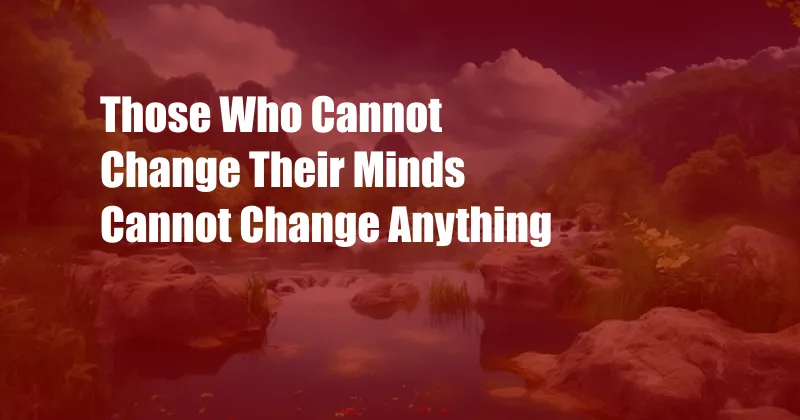
Those Who Cannot Change Their Minds Cannot Change Anything
In the ever-evolving tapestry of life, we encounter countless crossroads where our decisions shape our destiny. While some embrace change with open arms, others cling tenaciously to the familiar, fearing the uncharted waters that lie ahead. The philosopher George Bernard Shaw once said, “The reasonable man adapts himself to the world; the unreasonable one persists in trying to adapt the world to himself. Therefore, all progress depends on the unreasonable man.” This profound statement underscores the vital role of adaptability and open-mindedness in fostering personal and societal growth.
Change is an inevitable force that permeates every aspect of our existence. From the cyclical seasons of nature to the relentless march of technology, the world is in a constant state of flux. To navigate this ever-shifting landscape, we must cultivate the ability to evolve our thoughts, beliefs, and behaviors. Those who remain rigid in their ways, unwilling to embrace new ideas or perspectives, will find themselves falling behind the curve, unable to keep pace with the changing times.
The Perils of a Closed Mind
A closed mind is a prison that confines us within the narrow confines of our own limited experiences. It prevents us from seeing the world in all its complexity and richness, and it stifles our potential for growth and learning. When we refuse to challenge our assumptions or consider alternative viewpoints, we cut ourselves off from valuable perspectives and insights that could enrich our lives.
Moreover, closed-mindedness fosters intolerance and division. When we are convinced that our way is the only way, we become intolerant of those who hold different beliefs. This can lead to conflict, discrimination, and even violence. History is replete with examples of the devastating consequences of closed-mindedness, from the witch hunts of the Middle Ages to the genocides of the 20th century.
The Benefits of an Open Mind
In contrast to a closed mind, an open mind is a gateway to endless possibilities. It allows us to embrace new ideas, learn from our mistakes, and grow as individuals. An open mind fosters creativity, innovation, and problem-solving abilities. When we are willing to consider different perspectives, we can develop more nuanced and well-rounded opinions, and we are better equipped to make informed decisions.
Furthermore, an open mind promotes tolerance and understanding. When we are open to hearing the experiences and perspectives of others, we develop empathy and compassion. This can break down barriers between people and foster a more just and harmonious society. By embracing open-mindedness, we not only enrich our own lives but also make the world a better place for everyone.
Tips for Cultivating Open-mindedness
Cultivating open-mindedness is a lifelong journey. Here are a few simple tips to help you get started:
- Be willing to listen: Pay attention to what others have to say, even if their views differ from your own. Try to understand their perspectives without judgment.
- Seek out new experiences: Step outside of your comfort zone and try new things. This will expose you to different cultures, ideas, and ways of life.
- Read widely: Read books, articles, and blogs that challenge your existing beliefs. Engage with different viewpoints and perspectives.
- Challenge your assumptions: Question your own beliefs and assumptions. Are they based on facts or on personal biases? Be willing to let go of outdated or inaccurate beliefs.
- Practice empathy: Put yourself in the shoes of others. Try to understand their experiences and perspectives.
Expert Advice
Studies have shown that open-mindedness is associated with a number of positive outcomes, including improved cognitive performance, increased creativity, and greater well-being. Psychologist Dr. Scott Barry Kaufman, author of the book “Wired to Create,” emphasizes the importance of embracing divergent thinking and tolerating ambiguity. He argues that these traits are essential for innovation and problem-solving.
Neuroscientist Dr. Tali Sharot, author of the book “The Optimism Bias,” highlights the role of the brain’s reward system in shaping our beliefs. She explains that our brains are wired to seek out information that confirms our existing beliefs, which can lead to biased thinking. To overcome this bias, it is important to actively seek out information that challenges our assumptions.
FAQ
Q: Why is it important to change our minds?
A: Changing our minds allows us to learn, grow, and adapt to the ever-changing world around us. It prevents us from becoming stagnant and helps us to make better decisions.
Q: How can I overcome my resistance to change?
A: Start small by challenging your assumptions and seeking out new experiences. Gradually, you will become more comfortable with change and more open to new ideas.
Q: What are the benefits of open-mindedness?
A: Open-mindedness fosters creativity, innovation, problem-solving abilities, tolerance, and understanding. It makes us more well-rounded and better equipped to navigate the complexities of the modern world.
Conclusion
In an era characterized by rapid change and uncertainty, the ability to change our minds is more important than ever. Those who cling to outdated beliefs and refuse to embrace new ideas will find themselves left behind. By cultivating open-mindedness, we unlock our full potential for growth, learning, and positive change. As the philosopher Edmund Burke said, “The only thing necessary for the triumph of evil is for good men to do nothing.” Let us all strive to be agents of change, embracing open-mindedness and working together to create a better future for ourselves and for generations to come.
Are you interested in learning more about the importance of open-mindedness? Join the conversation by leaving a comment below.